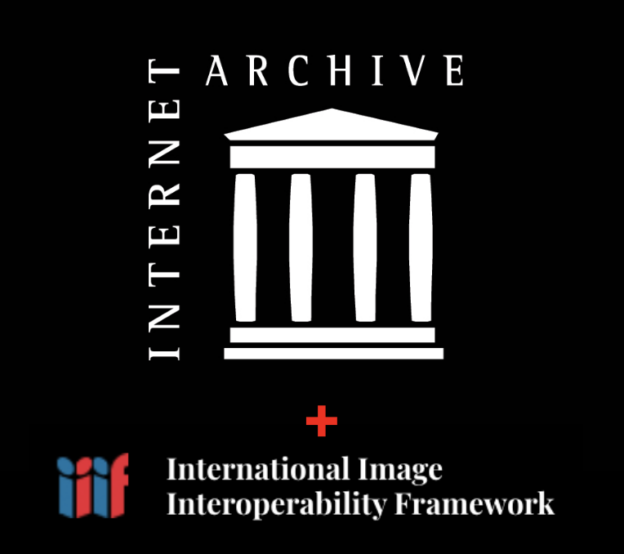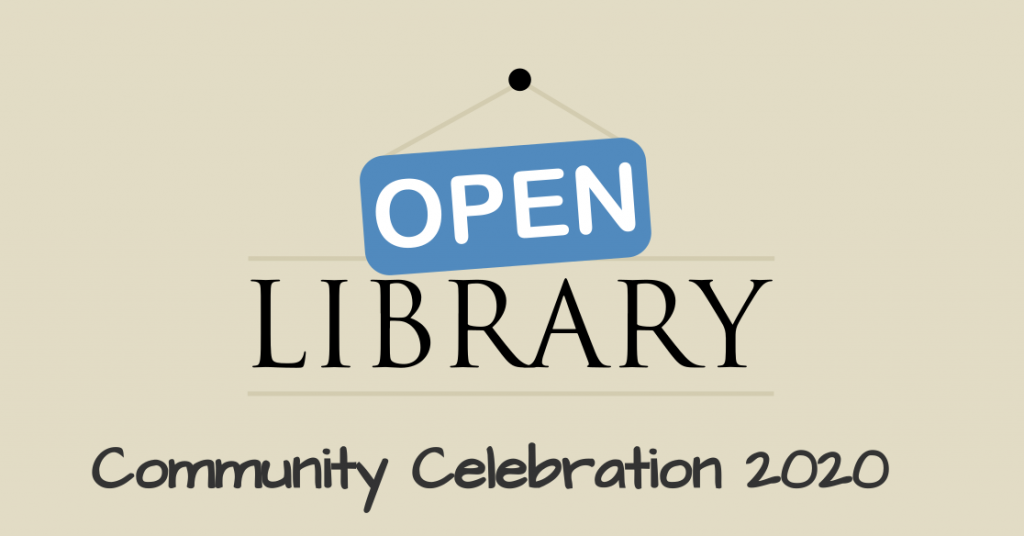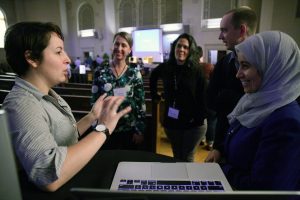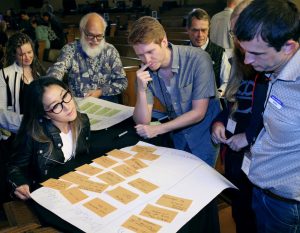A joint blog post between the Internet Archive and the IIIF Community
Summary
After eight years hosting an experimental IIIF service for public benefit, the Internet Archive is moving forward with important steps to make its International Image Interoperability Framework (IIIF) service official. Each year, the Internet Archive receives feedback from friends and partners asking about our long-term plans for supporting IIIF. In response, the Internet Archive is announcing an official IIIF service which aims to increase the resourcing and reliability of the Internet Archive’s IIIF service, upgrade the service to utilize the latest version 3.0 of the IIIF specification, and graduate the service from the iiif.archivelab.org domain to iiif.archive.org. The upgrade also expands the Internet Archive’s IIIF support beyond images to also include audio, movies, and collections — enabling deep zoom on high-resolution images, comparative item analysis, portability across media players, annotation support, and more.

Background
In 2015, a team of enthusiastic Internet Archive volunteers from a group called Archive Labs implemented an experimental IIIF service to give partners and patrons new ways of using Archive.org images and texts. You can read more about the project’s origins and ambitions in this 2015 announcement blog post. The initial service provided researchers with an easy, standardized way to crop and reference specific regions of archive.org images. (Maybe you can tell whose eyes these are?) By making Internet Archive images and texts IIIF-compatible, they may be opened using any number of compatible IIIF viewer apps, each offering their own advantages and unique features. For instance, Mirador is a “multi-up” viewer that makes it easy for researchers to view different images side by side and then zoom into or annotate different areas of interest within each image.
Since its launch more than seven years ago, the IIIF labs service has received millions of requests by more than 15 universities and GLAM (galleries, libraries, archives and museums) organizations across the globe, including University of Texas, UCD Digital Library, Havana University, Digital Library of Georgia, BioStor, Emory University, and McGill University. In this time, the broader IIIF ecosystem itself has blossomed to include hundreds of participating institutions. For all its benefits, the labs IIIF service has been considered “unofficial,” hosted on the separate archivelab.org domain, and several partners have voiced interest in the Internet Archive adopting it as an officially supported service. Today, several members of the IIIF community are collaborating with the Internet Archive to make this happen.
Josh Hadro, managing director of the IIIF Consortium (IIIF-C), sees the Internet Archive as filling a critical role “in serving the average Internet user who may not benefit from the same access to or affiliation with infrastructure offered by traditional research institutions.” The IIIF-C promotes interoperability as a core element of IIIF: the ability to streamline access to information and make cultural materials as easy to use and reuse as possible. Because the Internet Archive enables any patron to upload eligible materials, everyone has the opportunity to benefit from IIIF’s capabilities. IIIF-C counts the Internet Archive as a natural ally because of its ongoing support of open collections delivered via open web standards and protocols. With this project, IIIF-C hopes to make the Internet Archive a go-to resource online that facilitates IIIF work for students and scholars unaffiliated with the kinds of institutions that historically have provided IIIF infrastructure. This is an essential step toward a strategic goal of lowering barriers to IIIF usage and adoption worldwide.
In service of this outcome, the Internet Archive has teamed up with a number of IIIF community members to officialize and upgrade the IIIF service in order to make the best use of the new capabilities introduced into the IIIF specifications in recent years.
In the coming weeks, we’ll share more details about the IIIF improvements that will become available to users of the Internet Archive. First, we want to lay out our current plan for the update, including backwards compatibility affordances, to ensure existing consumers have the information they need to successfully migrate from the unofficial to the official IIIF API.
Thanks
Both the original IIIF labs service the Internet Archive has been running, as well as the new upcoming official IIIF service, wouldn’t have been possible without huge support from volunteers within the IIIF community and Internet Archive staff. A big thank you to the following folks who are making this effort to bring IIIF into production possible:
- Glen Robson
- Mike Bennett
- Sara Brumfield
- Ben Brumfield
- Josh Hadro
- Drew Winget
- Internet Archive staff, including Rob, Mek, Drini, Tracey, Brenton, et al.
Stay tuned for more details on the new functionality soon, and if you have questions or would like to get involved in helping us test the new setup, get in touch with IIIF-C at staff@iiif.io. For more updates, including September 13 IIIF Consortium community call announcing the Internet Archive’s IIIF service, please visit the IIIF community calendar at https://iiif.io/community/#calendar.
Technical Notes & FAQs for Partners
This technical section is intended for partners who currently rely on the iiif.archivelab.org IIIF API who may be seeking further details on how these changes might affect them.
What is changing? Previously, partners accessed the Internet Archive’s IIIF labs API from the iiif.archivelab.org domain. As part of the effort to graduate from labs to production, the IIIF API will move to the iiif.archive.org domain. Because we don’t want to break any of the amazing projects and exhibits that patrons have created using the existing IIIF capabilities on the archivelab.org domain, we’re migrating the API in phases.
Phasing migration. The first phase will introduce a new and improved, official Internet Archive IIIF 3.0 service on the iiif.archive.org subdomain. The unofficial, legacy service will continue to run on the iiif.archivelab.org for a grace period, allowing partners to migrate. Once we’ve gathered enough data to be confident requests are being satisfactorily fulfilled by the new official service, the legacy iiif.archivelab.org service will be “sunset” and any request to it will redirect to use the official iiif.archive.org service. At this point, all requests for IIIF manifests and IIIF images (whether to iiif.archivelab.org or iiif.archive.org) will default to the latest 3.0 version of the IIIF APIs and be answered by iiif.archive.org. A specifiable “version” endpoint will be available for consumers whose applications require manifests and images to be served using the IIIF v2.0 legacy format. More details, examples, and technical documentation will be made available on this topic in the coming weeks and will eventually be accessible from iiif.archive.org.
Possible Breaking Changes.
1. When the iiif.archivelab.org service was originally launched, iiif.archive.org was set up to redirect to iiif.archivelab.org as a convenience. Regrettably, during the first phase of development, iiif.archive.org will no longer be a redirect for iiif.archivelab.org and instead will run the new official IIIF service. As a result, partners whose code or applications reference iiif.archive.org (expecting it to redirect to iiif.archivelab.org) will experience a breaking change and will need to either update their references to explicitly refer to the legacy “iiif.archivelab.org” service, or update their code to use the Internet Archive’s new official iiif.archive.org service. As far as we can tell, we’re unaware of partners currently referencing “iiif.archive.org” within public projects on Github or Gitlab and so we hope no one is affected. Still, we want to give fair warning here. For those starting a new project and looking to use the Internet Archive’s IIIF offerings today, we strongly recommend using the iiif.archive.org endpoint.
2. Some partners migrating from the v2 to v3 API who have been saving annotations may also experience a breaking changes because canvas and manifest identifiers for version 3 are necessarily different from version 2 identifiers. We will be doing our best, for the time being, to ensure version 2.0 manifests remain accessible from the archivelab.org address (via redirects) and will retain the iiif.archivelab.org canvas identifiers.



